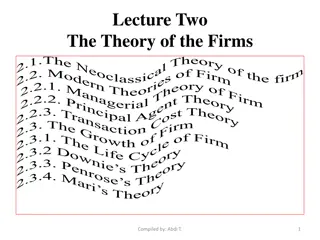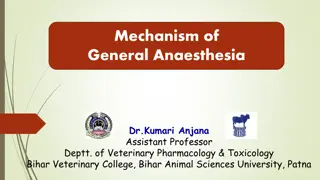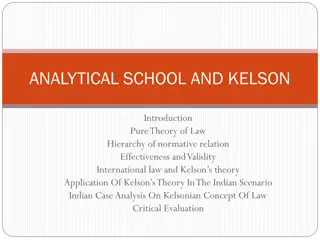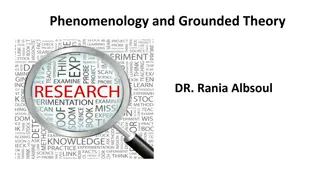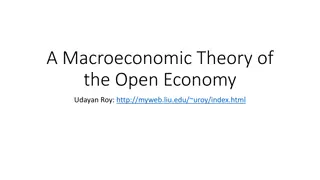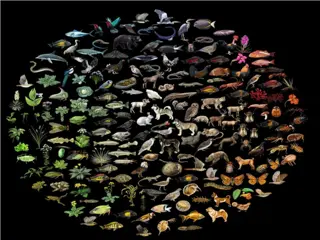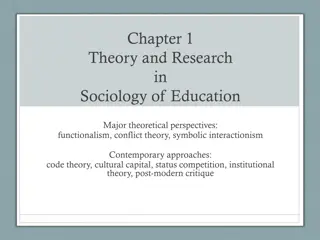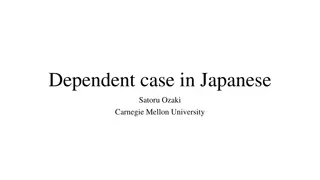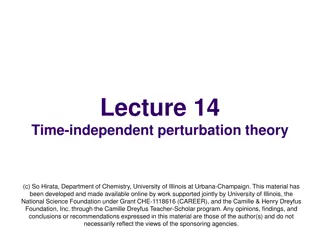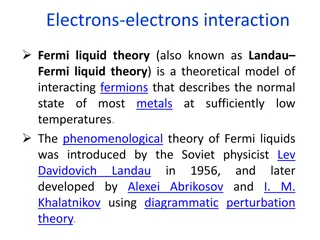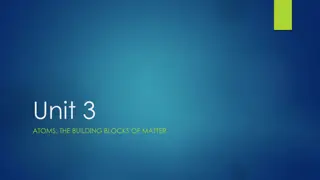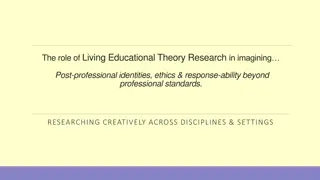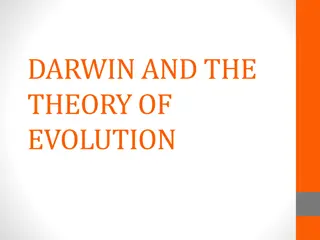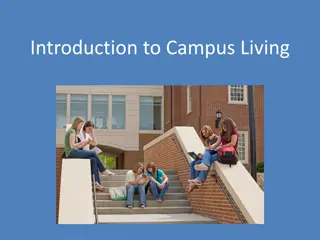Ginzburg Landau phenomenological Theory
The Ginzburg-Landau phenomenological theory explains superconductivity and superfluidity as distinct thermodynamic phases. It focuses on phase transitions characterized by singularities in specific heat at the transition temperature. Derived from BCS theory, it quantifies condensation energy, emphas
1 views • 38 slides
Crystal Field Theory in Transition Metal Complexes
Crystal Field Theory (CFT) explains the colors and magnetic properties of transition metal complexes. It focuses on the energy changes in d-orbitals of metal ions caused by surrounding ligands. This theory, developed in 1929, provides insights into the bonding interactions in complex compounds. The
10 views • 44 slides
30 Amazing Wall Colour Combinations for a Living Room To Take Inspiration From
Considering that your living room is the first part of your home that guests will see, the wall colour combination for the living room should be perfect to set the tone for the rest of your space. Here are some amazing wall colour combinations for a living room that you can take inspiration from:\n\
1 views • 33 slides
Evolution of Mathematical Theories and Proof Systems
Development of mathematical theories such as model theory, proof theory, set theory, recursion theory, and computational complexity is discussed, starting from historical perspectives with Dedekind and Peano to Godel's theorems, recursion theory's golden age in the 1930s, and advancements in proof t
2 views • 29 slides
Introduction to Organizational Behavior: Management Theories and Practices
Explore the evolution of organizational behavior from early management theories to contemporary practices. Understand the historical foundations and relevance of management theory in shaping workplace dynamics. Delve into key concepts like Scientific Management, Administrative Management, Bureaucrat
1 views • 28 slides
Theories on the Origin of State: Divine, Force, Patriarchal, and More
Various theories such as Divine Origin, Force Theory, Patriarchal Theory, and others explain the origin of the state. Divine theories attribute state creation to God, while Force Theory emphasizes the strong subjugating the weak to establish authority. Each theory offers unique perspectives on the h
1 views • 24 slides
Psychological Theories of Criminality: Understanding the Roots
Psychological theories of criminality delve into the association between intelligence, personality, learning, and criminal behavior. Major theories include Psychodynamic Theory by Freud, Behavioral Theory by Bandura, and Cognitive Theory by Kohlberg. These theories explore how unconscious mental pro
1 views • 20 slides
Austin's Theory of Law by Rinkey Sharma: An Overview
Austin's Theory of Law, presented by Rinkey Sharma, delves into the Imperative Theory of Law as proposed by Austin, known as the father of English jurisprudence. It explores General and Particular Jurisprudence, Austin's definition of law, and the elements of positive law, emphasizing the concepts o
0 views • 11 slides
Theories of International Relations Overview
The field of International Relations (IR) encompasses various theories that seek to explain global phenomena, drawing from disciplines like history, philosophy, and economics. Theory, derived from contemplation and speculation, organizes ideas to explain issues such as state emergence, conflict caus
1 views • 47 slides
Overview of Cooperative Game Theory and Bargaining Solutions
Cooperative game theory explores situations where players have mutual benefits in cooperating. The focus is on bargaining solutions to reach agreements despite conflicting interests. Key concepts include Nash Bargaining Solution, Kalai-Smorodinsky Bargaining Solution, and Rubinstein Bargaining Proce
2 views • 24 slides
Theory of Firms: Neoclassical vs. Modern Approaches
The theory of firms is explored through the Neoclassical and Modern perspectives. Neoclassical theory focuses on profit maximization, while Modern theory delves into managerial, principal-agent, and transaction cost theories. The discussion covers criticisms of Neoclassical theory and the essential
1 views • 79 slides
Mechanism of General Anaesthesia Theories: Lipid Solubility, Surface Tension, Microcrystal, Protein Binding
Mechanism of general anaesthesia involves theories focusing on the interaction of anaesthetics with cell membrane components like lipids and proteins. The Lipid Solubility theory emphasizes the importance of an anaesthetic's affinity and solubility in nerve cell membranes, while the Surface Tension
3 views • 10 slides
Analytical School and Kelson's Pure Theory of Law: A Critical Analysis
Kelsen's Pure Theory of Law emphasizes the hierarchy of norms and the normative character of law, free from extra-legal elements. This theory, in contrast to other perspectives like Hart's, aims to maintain the purity of law by isolating strictly legal components. Kelsen's focus on normative behavio
1 views • 15 slides
Theories of Causation in Psychological and Social Sciences
Overview of theories of causation categorized into psychological, social psychological, and sociological perspectives. Psychological theories focus on instinctive, biological, and psychological qualities of abusers, including Attachment Theory, Psychodynamic Theory, Social Learning Theory, and Situa
0 views • 15 slides
Phenomenology and Grounded Theory in Qualitative Research
Phenomenology and Grounded Theory are key methods in qualitative research, focusing on understanding lived experiences and developing deep insights into phenomena. Phenomenology delves into the essence of appearances, while Grounded Theory explores the grounded elements of research. Through these me
1 views • 44 slides
Political Theory through a Contextual Approach
Exploring G.H. Sabine's perspective on political theory through a contextual approach, emphasizing the importance of historical context and societal influences. Sabine argues that while political theory evolves with its contemporary politics, it should be analyzed within its specific time and social
0 views • 9 slides
Macroeconomic Theory of the Open Economy by Udayan Roy
This presentation discusses key concepts related to the open economy, such as net exports equaling net capital outflow, national saving equaling domestic investment plus net capital outflow, the loanable funds theory of the real interest rate, and the relationship between saving, investment, and net
0 views • 31 slides
Harbor Terrace Modern comfortable assisted living facilities in USA
Best Assisted living facilities in San Pedro | Los Angeles | California | USA\nAssisted living homes in San Pedro | Los Angeles | California | USA\nAssisted living facilities in San Pedro | Los Angeles | California | USA\nSenior assisted living in Sa
0 views • 12 slides
Evolution of Cell Theory: From Observations to Modern Understanding
Robert Hooke and Robert Brown made key observations leading to the cell theory, while M.J. Schleiden, Theodore Schwann, and Rudolf Virchow developed the foundational principles. The modern cell theory expanded to include energy flow, heredity, and cell composition. Protoplasm theory highlighted the
10 views • 20 slides
Evolution of Light Theory: From Wave Theory to Quantum Theory
At the turn of the century, the discovery of the photoelectric effect challenged the wave theory of light, leading to the development of the quantum theory by Max Planck and Albert Einstein. This new theory introduced the concept of discrete energy units known as quanta, bridging the gap between wav
2 views • 62 slides
Theoretical Perspectives in Sociology of Education
Exploring major theoretical perspectives such as functionalism, conflict theory, and symbolic interactionism along with contemporary approaches like code theory, cultural capital, and status competition. The functionalist theory emphasizes social cohesion and maintaining social order through educati
4 views • 14 slides
Living in the Flesh vs. Living in the Spirit
Explore the contrasting mindsets of living in the flesh and living in the spirit, as outlined in Romans 8:5-11. Discover the key principles of condemnation, mindset, and spiritual alignment, emphasizing the transformative power of the Spirit over the flesh in Christian living.
0 views • 13 slides
Dependent Case Theory in Japanese Linguistics
Dependent case theory challenges traditional views on case assignment, particularly in the context of Japanese grammar. This theory argues for a different approach to case assignment based on interpretative processes rather than licensing conditions. The theory is explored in-depth, discussing neces
2 views • 40 slides
Dp-branes, NS5-branes, U-duality, and M-Theory Overview
Overview of Dp-branes, NS5-branes, and U-duality derived from nonabelian (2,0) theory with Lie 3-algebra. Introduction to M-theory, including M2-branes and M5-branes in the strong coupling limit. Discussion on BLG theory, Lorentzian Lie 3-algebra, and the ABJM theory for M2-branes.
3 views • 32 slides
Shared Living Service Overview for Independent Living with Supports
The Shared Living Service, facilitated by Deanna L. Parker, MPA VA DBHDS, offers individuals aged 18 and above the opportunity to live independently with some support. This service is available under all three waivers and entails a one-to-one living arrangement where a roommate provides agreed-upon
0 views • 20 slides
Time-Independent Perturbation Theory in Quantum Mechanics
Perturbation theory is a powerful tool in solving complex physical and mathematical problems approximately by adjusting solutions from a related problem with known solutions. This theory allows for more accurate approximate solutions by treating the difference as a small perturbation. An example inv
0 views • 19 slides
Ethical Theories: Divine Command vs. Virtue Theory Explained
Divine Command Theory asserts that morality is derived from God's commands, contrasting with Virtue Theory which focuses on developing moral virtues to achieve human flourishing and excellence. Divine Command Theory relies on religious texts, while Virtue Theory emphasizes the cultivation of virtues
0 views • 24 slides
Fermi Liquid Theory in Interacting Fermion Systems
Fermi liquid theory, also known as Landau-Fermi liquid theory, is a theoretical model that describes the normal state of metals at low temperatures. Introduced by Landau and further developed by Abrikosov and Khalatnikov, this theory explains the similarities and differences between interacting ferm
0 views • 23 slides
The Characteristics of Living Things
Explore the key characteristics of living things, including the need for materials, energy, and living space, as well as the organizational structure, growth, reproduction, and ability to respond to the environment. Dive into topics such as the Cell Theory, spontaneous generation theories by scienti
0 views • 12 slides
Computational Learning Theory: An Overview
Computational Learning Theory explores inductive learning algorithms that generate hypotheses from training sets, emphasizing the uncertainty of generalization. The theory introduces probabilities to measure correctness and certainty, addressing challenges in learning hidden concepts. Through exampl
0 views • 43 slides
Automata Theory and Theory of Computation Overview
This course overview covers concepts in automata theory and theory of computation, including formal language classes, grammars, recognizers, theorems in automata theory, decidability, and intractability of computational problems. The Chomsky hierarchy, interplay between computing components, modern-
0 views • 42 slides
Theories of Interest in Microeconomics II
Explore various theories of interest in economics, including the Classical Theory, Liquidity Preference Theory by Keynes, Productivity Theory, Abstinence Theory, Time-Preference Theory, Fisher's Time Preference Theory, and the Loanable Fund Theory. These theories offer different perspectives on the
1 views • 6 slides
Collaborative Efforts in Provisioning Services for Children in Foster Care Living with HIV
Exploring the need for collaboration between social workers and community volunteers in providing services to children in foster care living with HIV, this study highlights the challenges faced by these vulnerable children due to gaps in support and monitoring. By examining the theoretical framework
0 views • 19 slides
The Evolution of Atomic Theory
Delve into the historical journey of atomic theory starting from Democritus and Aristotle's views to modern advancements proving some aspects of Dalton's theory incorrect. Learn about key laws and theories such as the Particle Theory of Matter, Dalton's Atomic Theory, and JJ Thomson's discoveries, s
0 views • 30 slides
Living Educational Theory Research in Professional Development
Living Educational Theory Research plays a crucial role in shaping post-professional identities and expanding ethical responsibilities beyond conventional standards in physiotherapy educational practice. By engaging in this research, professionals can transform their practices, incorporate existing
0 views • 8 slides
Darwin and the Theory of Evolution: A Comprehensive Overview
Darwin's Theory of Evolution encompasses the concepts of organisms changing over time and life evolving through natural selection. Influenced by scientists such as James Hutton, Jean Baptiste Lamarck, and Alfred Russel Wallace, Darwin's theory culminates in the idea of evolution by natural selection
0 views • 9 slides
The Characteristics of Living Organisms
This content covers the basic principles and characteristics of life, including organization, response to stimuli, homeostasis, metabolism, growth and development, reproduction, and evolution. It also explains the levels of organization in living organisms, the aspects of cell theory, and why viruse
0 views • 54 slides
Campus Living: A Comprehensive Guide
Discover the various college living options, from on-campus residence halls to off-campus apartments. Learn about residence hall types, amenities, and Living-Learning Communities that enhance the student experience. Explore themed Living Learning Communities and roles of individuals in campus living
0 views • 11 slides
Living and Non-living Things: Unit 1 Activities
Dive into the concept of living and non-living things with engaging activities such as learning about examples of living things, going on a living things hunt, and watching educational videos. Get hands-on by observing, drawing, and sharing your findings to deepen your understanding in an interactiv
1 views • 4 slides
Macromechanical Analysis of Lamina and Tsai-Hill Failure Theory Overview
The Tsai-Hill failure theory is based on the strengths of a unidirectional lamina, incorporating longitudinal and transverse tensile and compressive strengths, as well as in-plane shear strength. This theory, derived from the distortion energy theory, provides criteria for determining lamina failure
0 views • 15 slides










